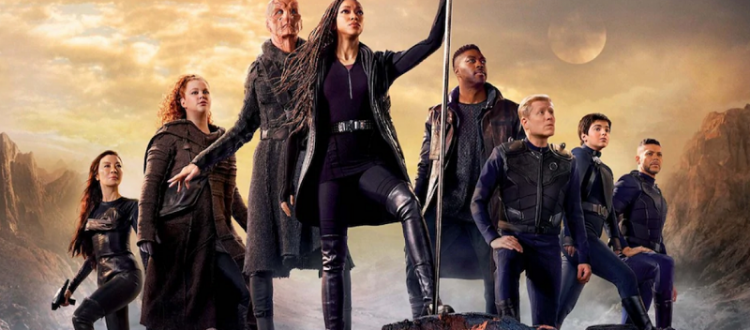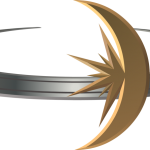The Hope that is Dilithium
“The Federation is people.” This single proclamation from Sonequa Martin-Green’s Michael Burnham’s has stuck with me more than anything else that came about in the third season of Star Trek Discovery.
Well, that’s a lie. Adil Hussain as Aditya Sahil stands out more than anything else. What I wouldn’t give to spend this essay writing about Sahil as the lone lighthouse keeper – this solitary figure standing vigil for the return of ideals and institutions to a galaxy turned on its head. I hoped such a conceit would drive Discovery’s third season. Alas, here we are, talking about magic go-crystals.
Go-crystals come down to the third season of Discovery having a problem of showing and telling. On the one hand, the writing steers Michael Burnham to make bold statements like “The Federation is people,” as an antecedent to spending character gains earned over two years faster than a drunken Ferengi would lose their latinum on a rigged Dabo wheel.
Putting a bracket around the fact that insubordination and going rogue was a season-long arc for Michael Burnham in the past (spoiler: Mirror Georgiou makes the trauma that came from getting her mentor stabbed through the heart vanish) the message that Burnham offers rings true enough. The audience is meant to see Federation and Starfleet as the best of ourselves. Those institutions are our highest ideals enshrined in a blue and white flag. The Federation’s semiotics intentionally evoke the United Nations and a Wilsonian belief in the value of collective actions in the name of an unshakable and universal good.
That’s the story talking to the audience, and while there is a time and a place for telling, there’s no reconciling the words Sonequa Martin-Green says with the world building the writers create. Case in point: the Federation, a centuries old institution within Star Trek’s internal history, collapses when the howls of a psionic teenager destroy the Alpha/Beta quadrant’s supply of dilithium.
Jesus Hannibal Christ. I didn’t think Star Trek could throw dumber things at its audience after the time an alien immaculately concepted Troi and Worf demanded a forced abortion. Star Trek in 1989, as in 2020, is a fucking trip.
Be that as it may, there’s a lot to be said for introducing resource scarcity into post-scarcity Star Trek. Yet in this case, the execution is so thoughtless that is has the impact of reducing the Federation to little more than a petrostate. Don’t know what a petrostate is? Then congratulations on making good life choices and not getting a graduate degree in history.
Petrostates are nation states whose economies are almost entirely dependent on oil extraction. If the bottom falls out of the oil economy in a petrostate, or its oil disappears, so too does the nation’s economy and with it order and stability. Disco shows that the absence of dilithium served to reduce the Federation from housing 350 member worlds to 38. Beyond that, we see founding members of the Federation – civilizations with, at a minimum, a millennium of world government and interstellar travel – reverting to the kind of barbarism that a Trek fan would be right to expect from the Mirror-Universe.
Earth not only evicts both the Federation and Starfleet’s headquarters but it transforms into a state so isolationist that it cuts ties to other human colonies within the Sol system. Come on, man, Earth to Jupiter at full impulse is about a 3 hour trip. Don’t pretend that space is big in Star Trek.
Vulcan, at some point before the 32nd century, unifies with the Romulan Free State. This is cool, but it also has the effect of turning this hybrid civilization into a planet inhabited by dramatic, bowl-cut having xenophobes.
Andoria gets in bed with Orion, and discovers the latter world’s penchant for slavery and libertarianism. Where Andorians were once honour bound warriors, they are now slavers and pirates.
And, as usual, nobody cares about the Tellaraites because they are gross and have pig faces.
These things happen because the Federation is not able to exist without dilithium, or dare I even say, because the Federation is not able to exist without Starfleet standing by to enforce the Pax Federatorum. This is not a point of interpretation or some deep reading of the subtext. These are all observable points of plot and world building that can be read off the script. Remove dilithium and everyone reverts to tribalism. Introduce dilithium and all of a sudden people are willing to come back to the Federation.
How then can the audience take the dialogue seriously vis-à-vis “the Federation people” when the line between unity and tribalism is so clearly defined as either an abundance or scarcity of dilithium? Disco’s writers have the characters saying the right things in support of what the Federation ought to be, but their writing is showing a wildly different story. The only character voice that so much as flirts with this duality between showing and telling is Osyraa, the leader of the Andorian-Orion Emerald Chain. She accuses Admiral Vance, the Commander-in-Chief of Starfleet-in-exile, of arrogance and paternalism. There is absolutely something to be said in support of that critique. This is particularly so in the context of the Federation’s reputation for sitting on its hands where genocides and natural disasters are concerned. *cough* *Cardassian occupation of Bajor* *cough* *Sisko using WMDs on DMZ colonies* *cough* *cough* *Sisko is a war criminal*
But Osyraa’s words only exist to offer villainy to Admiral Vance’s party line. Vance, like Burnham, says appropriately Starfleet things, namely asking Osyraa to stand trial for all the pillaging and slaving. Yet these very Starfleet things exist in contrast to Vance securing a dilithium planet and leveraging it to start rebuilding the Federation. This very act of nascent empire building – one delivered without so much as an establishing shot on the Federation Council offering civilian sanction to Vance’s military decision – perpetuates the problem of expansionism that Vance named as a long-term cause of the Federation’s pre-Burn problems. In other words, the Federation is back…at least until the new single source of dilithium is mined out or stolen.
Thus, in the epilogue of The Hope That Is You, Part 2 it’s not the ideals of the Federation that bring Trill and Vulcan back to the table. It’s not Michael Burnham giving an impassioned speech on making rock soup in hard times. The Federation is reborn with the USS Discovery acting as a dilithium mule. It naturally follows that with that dilithium in play, a mothballed Starfleet can return to service. And that fleet should offer all the quantum torpedos necessary to protect Federation hegemony: pax propter phasorum, baby.
Therein rests the ultimate takeaway from Disco’s third season. Certainly, everyone says the right things, but the motion of the story, the showing in contrast to the actors’ telling, is clear: so far as this creative team is concerned, the Federation is a single mineral. Without that mineral, the ideals and integrated planetary economies that should have held together, if nobody else, the oldest and geographically closest members of the Federation (Earth, Vulcan, Andor, Tellar, Denobula, Rigel, and Coridan) saw those very worlds driven to xenophobia and barbarism.
The Federation should be Aditya Sahil guarding a flag he is unwilling to raise until someone is there to accept his paperwork. Goofy as that is, it succeeds in having a sense of harmony between a story’s showing and telling. It is consistent with itself, which makes it that much stronger of a through line.
Instead, the audience is presented with the chaos of dialogue and action at odds with each other. In one breath, characters can give full-throated speeches in support of idealism. Within a few beats the plot will catch up to the dialogue to remind us that economic pragmatism was what held the Federation together. I will come to Stark Trek any day of the week for goofy idealism, but to watch a show give itself high fives for scoring at least one-goal per episode in terms of internal consistency is a bit much.













